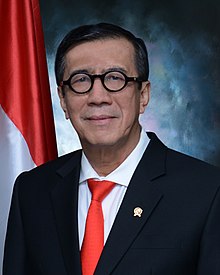A regency, sometimes incorrectly referred to as a district, is an administrative division of Indonesia, directly under a province and on the same level with city (kota). Regencies are divided into districts.

The 1945 State Constitution of the Republic of Indonesia is the supreme law and basis for all laws of Indonesia.
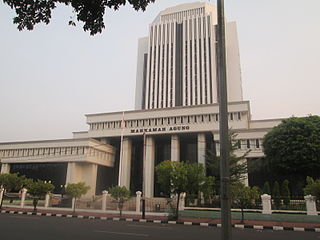
The Judiciary of Indonesia constitutionally consists of the Supreme Court of Indonesia, the Constitutional Court of Indonesia, and the lesser court system under the Supreme Court. These lesser courts are categorically subdivided into the public courts, religious courts, state administrative courts, and military courts.
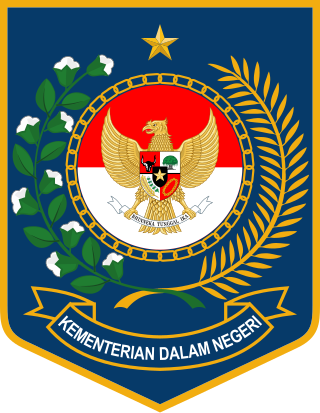
The Ministry of Home Affairs is a ministry of the Government of Indonesia responsible for internal matters of the state. The ministry was formerly known as the Department of Home Affairs until 2010 when the nomenclature of the Department of Home Affairs was changed to the Ministry of Home Affairs in accordance with the Regulation of the Minister of Home Affairs Number 3 of 2010 on the Nomenclature of the Ministry of Home Affairs.
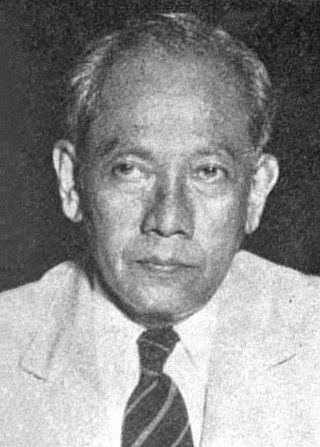
Soeprapto was the fourth Attorney General of Indonesia. Born in Trenggalek, East Java, Soeprapto studied law in Jakarta, finding work in the legal system soon after graduating in 1920. After transferring often, in the early 1940s he had reached Pekalongan and become the head of the court for Native Indonesians. Escaping Pekalongan during Operation Product with the help of a prisoner he had just sentenced, Soeprapto made his way to Yogyakarta and began to work as a prosecutor. When the government moved to Jakarta in 1950, Soeprapto went with it. In January 1951, he was selected to be Prosecutor General of Indonesia, serving until 1 April 1959.
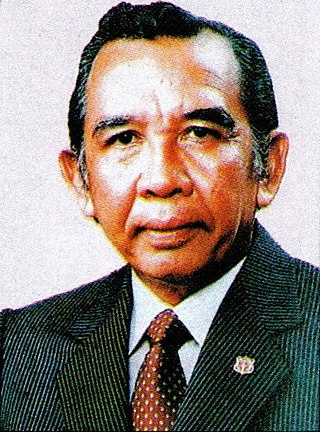
Lieutenant General Ismail Saleh was Prosecutor General and later Minister of Justice of Indonesia.
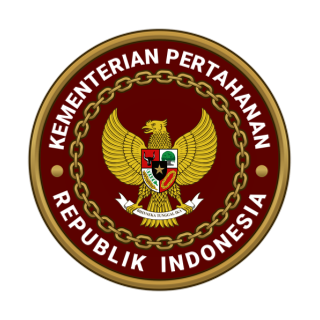
The Ministry of Defense of the Republic of Indonesia is a government ministry responsible for the defense affairs of Indonesia. The ministry was formerly known as the Department of Defense until 2009 when the nomenclature changed based on Law Number 39 of 2008 dated 6 November 2008 concerning State Ministries, the name of the Department of Defense was changed to the Ministry of Defense of the Republic of Indonesia. The currently-appointed minister is Prabowo Subianto replacing Ryamizard Ryacudu on 23 October 2019.
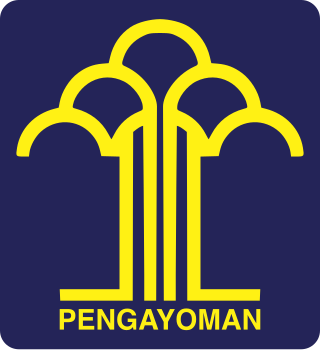
The Ministry of Law and Human Rights is an Indonesian ministry that administers laws and human rights. It is responsible to the president, and is led by the Minister of Law and Human Rights, Yasonna Laoly, since 27 October 2014. The first minister was Soepomo.

The Ministry of Religious Affairs is an Indonesian ministry that administers religious affairs. It is responsible to the president, and is led by a minister.

Ministry of State Apparatus Utilization and Bureaucratic Reform is a government ministry that is responsible for public servants in Indonesia. The ministry reports to the President of Indonesia. and is currently led by Abdullah Azwar Anas as minister

Coordinating Ministry for Human Development and Cultural Affairs is an Indonesian coordinating ministry. The ministry has the function to coordinate, synchronized and control governance in human development and culture.

Ministry of Industry is an Indonesian ministry. The ministry is under, and is responsible to, the President of Indonesia.

The Office of the Attorney General of the Republic of Indonesia is the competent authority to advise the Government of Indonesia on matters of law. It serves as the central organization for the Indonesian Public Prosecution Service. The Attorney General's Office is seated in the national capital Jakarta.

The Directorate General of Marine and Fisheries Resources Surveillance is a government agency under the management of the Ministry of Marine Affairs and Fisheries of Indonesia. Formally established on 23 November 2000 according to Presidential Decree No. 165/2000, the PSDKP is the agency responsible for supervising the marine and fishery resources of the Republic of Indonesia. The main mission of PSDKP is the prevention of Illegal, unreported and unregulated fishing in Indonesian waters, which has caused a substantial loss for Indonesia's fishing industry. In its mission to prevent illegal fishing, PSDKP has conducted joint-operations with the Indonesian Navy, Water Police, Sea and Coast Guard, the Maritime Security Agency and Customs. PSDKP is however is not associated with these agencies.

The Chief of the Indonesian National Police, commonly known as the National Police Chief, is the official who heads the Indonesian National Police (Polri).
In Indonesian law, the term "city" is generally defined as the second-level administrative subdivision of the Republic of Indonesia, an equivalent to regency. The difference between a city and a regency is that a city has non-agricultural economic activities and a dense urban population, while a regency comprises predominantly rural areas and is larger in area than a city. However, Indonesia historically had several classifications of cities.

The Governor of North Sumatra is the highest office in the province of North Sumatra. The governor of North Sumatra is an elected official who is responsible for leading the government in North Sumatra, proposing and enacting regional laws, and representing the North Sumatra province inside and outside the court. The governor alongside the deputy governor and 100 members of the Regional People's Representative Council are accountable for the strategic government of the province of North Sumatra.

National Cyber and Crypto Agency, is Indonesia's primary signal intelligence agency, as well as cyber intelligence, cyber threat intelligence, cyber defense, and cyber security agency.

National Resilience Institute is an Indonesian Non-Ministerial Government Agency tasked with carrying out government duties in the field of education for national leaders, strategic assessment of national resilience and strengthening of national values.
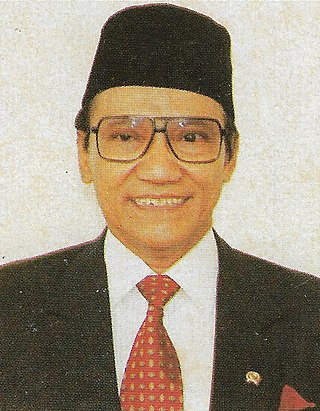
Soni Harsono was an Indonesian engineer and bureaucrat. He worked for decades in the Department of Industry and the Ministry of State Secretariat until his appointment as the Head of the National Land Agency in 1988. The post was elevated to a cabinet-level post in 1993 as the State Minister of Agrarian Affairs. He became minister until 1998.





